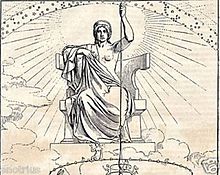| Ananke | |
|---|---|
Personification of Necessity and Inevitability | |
| Member of the Greek primordial deities | |
 | |
| Other names | Adrastea |
| Abode | The cosmos |
| Symbol | torch, spindle |
| Genealogy | |
| Parents | self-formed |
| Siblings | |
| Consort | Chronos |
| Offspring | |
| Part of a series on |
| Ancient Greek religion |
|---|
 |
| Greek deities series |
|---|
| Primordial deities |
In ancient Greek religion, Ananke (/əˈnæŋkiː/; Ancient Greek: Ἀνάγκη), from the common noun ἀνάγκη ("force, constraint, necessity"), is the Orphic personification of inevitability, compulsion and necessity. She is customarily depicted as holding a spindle. One of the Greek primordial deities, the births of Ananke and her brother and consort, Chronos (the personification of time, not to be confused with the Titan Cronus), were thought to mark the division between the eon of Chaos and the beginning of the cosmos. Ananke is considered the most powerful dictator of fate and circumstance. Mortals and gods alike respected her power and paid her homage. She is also considered the mother of the Fates, hence she is thought to be the only being to overrule their decisions[1] (according to some sources, excepting Zeus also). According to Daniel Schowalter and Steven Friesen, she and the Fates "are all sufficiently tied to early Greek mythology to make their Greek origins likely."[2]
The ancient Greek traveller Pausanias wrote of a temple in ancient Corinth where the goddesses Ananke and Bia (meaning force, violence or violent haste) were worshiped together in the same shrine. Ananke is also frequently identified or associated with Aphrodite, especially Aphrodite Urania, the representation of abstract celestial love; the two were considered to be related, as relatively unanthropomorphised powers that dictated the course of life.[3][4][5][6] Her Roman counterpart is Necessitas ("necessity").[7]
- ^ Abril Cultural, ed. (1973). Dicionário de Mitologia Greco-Romana (in Portuguese). Editora Victor Civita. p. 134. OCLC 45781956.
- ^ Schowalter, Daniel N.; Friesen, Steven J. (2005). Urban Religion in Roman Corinth: Interdisciplinary Approaches Issue 53 of Harvard theological studies. Harvard Theological Studies, Harvard Divinity School. p. 147. ISBN 9780674016606.
- ^ Papaioannou, Sophia; Serafim, Andreas; Demetriou, Kyriakos (25 October 2021). Rhetoric and Religion in Ancient Greece and Rome. Walter de Gruyter GmbH & Co KG. ISBN 978-3-11-069970-8. Retrieved 10 April 2024.
- ^ Ivanov, Vi͡acheslav Ivanovich; Bird, Robert; Wachtel, Michael (2001). Selected Essays. Northwestern University Press. p. 154. ISBN 9780810115224.
- ^ Portmann, Adolf; Ritsema, Rudolf (Jan 1, 1977). Avenir Et Devenir Des Normes. Brill Archive. p. 100. ISBN 9789004048805.
- ^ Stroud, Ronald (Sep 30, 2013). The Sanctuary of Demeter and Kore: The Inscriptions XVIII.6. American School of Classical Studies at Athens. p. 84. ISBN 9781621390138.
- ^ Dräger, Paul (2006). "Ananke". Brill's New Pauly. doi:10.1163/1574-9347_bnp_e119980.